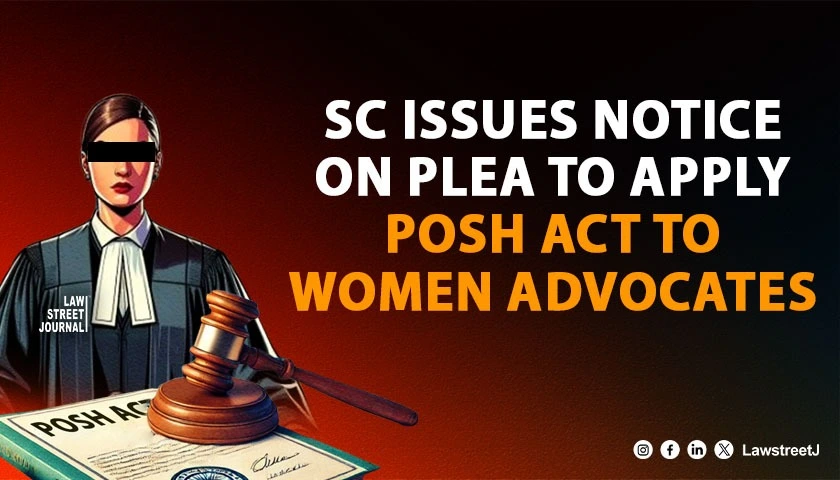New Delhi: The Supreme Court of India has issued notice on a petition filed by the Supreme Court Women Lawyers Association (SCWLA) seeking a declaration that the Sexual Harassment of Women at Workplace (Prevention, Prohibition and Redressal) Act, 2013 applies to women advocates practising before courts and that Bar Councils and Bar Associations across the country are legally bound to constitute Internal Complaints Committees (ICCs) under the Act. The petition challenges the Bombay High Court’s judgment dated 7 July 2025 in UNS Women Legal Association (Regd.) v. Bar Council of India & Others, which held that the POSH Act does not apply to complaints made by women advocates before Bar Councils in the absence of an employer–employee relationship.
The Supreme Court Bench comprising Justice B.V. Nagarathna and Justice R. Mahadevan heard Senior Advocate Mahalakshmi Pavani, appearing for the SCWLA, who submitted that the Bombay High Court’s interpretation undermines the very purpose of the POSH Act, whose sweep, according to its preamble, extends to “working women, whether employed or not,” and was enacted to protect dignity and safety in all workplaces. She argued that the statutory definitions of “aggrieved woman” under Section 2(a) and “workplace” under Section 2(o) of the Act include women in professional and non-traditional employment structures, and therefore necessarily cover courts, Bar Councils, Bar Associations, and similar professional bodies. It was further pointed out that the Advocates Act, 1961 does not contain provisions for confidentiality and mandatory timelines for inquiry, which the POSH Act expressly provides, creating a regulatory gap that leaves women advocates without effective redressal.
The petitioners contended that the reasoning of the Bombay High Court—holding that Bar Councils are not employers of advocates and therefore the POSH Act cannot apply—is contrary to precedent and constitutional guarantees. Reliance was placed on decisions such as Vishaka v. State of Rajasthan and Medha Kotwal Lele v. Union of India, which recognise that professional and public bodies must adopt binding mechanisms against sexual harassment even beyond traditional employment structures. It was also argued that women advocates who suffer sexual harassment in courts, chambers, Bar Council offices, or professional gatherings cannot be compelled to resort solely to Section 35 of the Advocates Act, which is limited to professional misconduct and lacks the remedial framework mandated by the POSH Act.
The Court also considered submissions in a connected matter filed by Advocate Seema Joshi, whose case has been tagged with the present petition. It was highlighted that complaints lodged before various Gender Sensitisation and Internal Complaints Committees in different courts—including the Supreme Court’s GSICC—often involve women practising independently and not engaged in any employer–employee relationship, yet are treated as maintainable under the POSH Act framework. The Supreme Court observed during the hearing that the issue carries far-reaching implications for women practitioners across the country.
Senior Advocate Mahalakshmi Pavani submitted that unless Bar Councils and Bar Associations are mandated to establish ICCs, the intention of Parliament to ensure safe working environments for all women will be defeated. The petitioners requested interim directions that all State Bar Councils, the Bar Council of India, and Bar Associations continue to maintain ICCs pending the final outcome.
Appearing for the petitioners were Senior Advocate Mahalakshmi Pavani and Advocate-on-Record Sneha Kalita. Advocate Seema Joshi was represented in her tagged petition. The Supreme Court has issued notice to the Bar Council of India and the Union of India. Counsel for the respondents will file their replies before the next date of hearing. The matter will now proceed to fuller consideration, and the Court’s ruling is likely to have significant consequences for the regulatory framework governing professional conduct and workplaces in the legal profession.
Case Title: Supreme Court Women Lawyers Association v. Bar Council of India & Others (tagged with Seema Joshi v. Bar Council of India & Others)
Diary No.: 49533 of 2025
Bench: Justice B.V. Nagarathna and Justice R. Mahadevan
Date of Order: As per Supreme Court listing record
Appearing for Petitioners: Senior Advocate Mahalakshmi Pavani; AOR Sneha Kalita; Advocate Seema Joshi (in the tagged matter)













